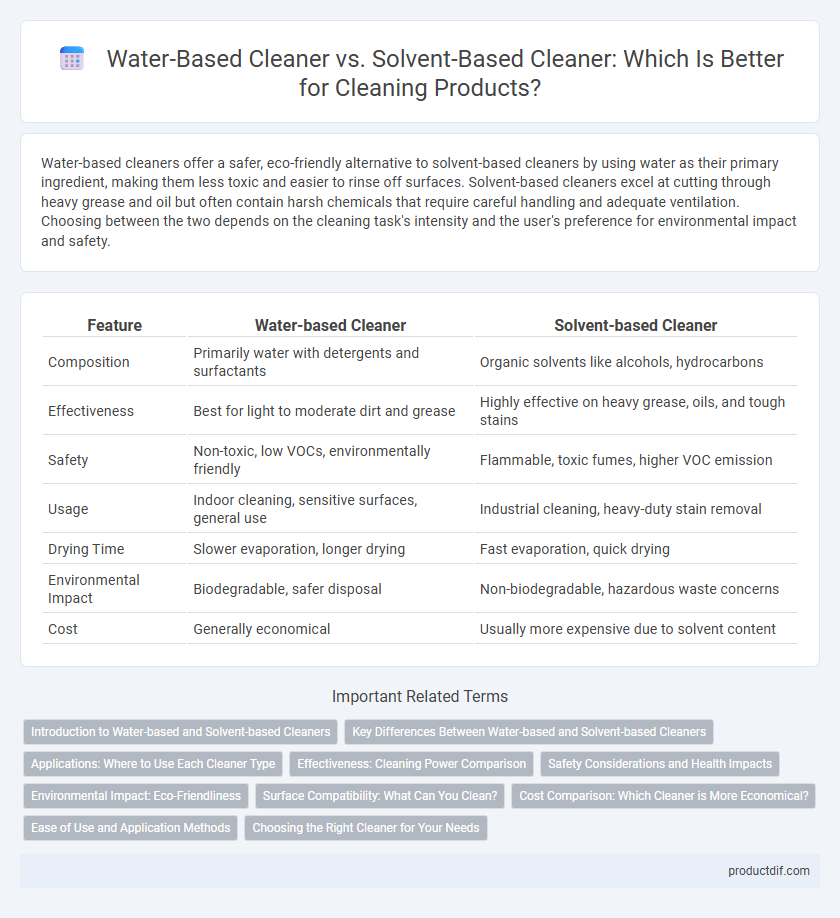Water-based cleaners offer a safer, eco-friendly alternative to solvent-based cleaners by using water as their primary ingredient, making them less toxic and easier to rinse off surfaces. Solvent-based cleaners excel at cutting through heavy grease and oil but often contain harsh chemicals that require careful handling and adequate ventilation. Choosing between the two depends on the cleaning task's intensity and the user's preference for environmental impact and safety.
Table of Comparison
| Feature | Water-based Cleaner | Solvent-based Cleaner |
|---|---|---|
| Composition | Primarily water with detergents and surfactants | Organic solvents like alcohols, hydrocarbons |
| Effectiveness | Best for light to moderate dirt and grease | Highly effective on heavy grease, oils, and tough stains |
| Safety | Non-toxic, low VOCs, environmentally friendly | Flammable, toxic fumes, higher VOC emission |
| Usage | Indoor cleaning, sensitive surfaces, general use | Industrial cleaning, heavy-duty stain removal |
| Drying Time | Slower evaporation, longer drying | Fast evaporation, quick drying |
| Environmental Impact | Biodegradable, safer disposal | Non-biodegradable, hazardous waste concerns |
| Cost | Generally economical | Usually more expensive due to solvent content |
Introduction to Water-based and Solvent-based Cleaners
Water-based cleaners use water as the primary solvent, making them environmentally friendly and ideal for removing dirt and grime from surfaces without harsh chemicals. Solvent-based cleaners rely on organic solvents like hydrocarbons or alcohols, offering stronger grease and oil removal capabilities for industrial or heavy-duty cleaning tasks. Understanding the composition and application of each type ensures effective cleaning while minimizing potential surface damage and health risks.
Key Differences Between Water-based and Solvent-based Cleaners
Water-based cleaners primarily use water as a solvent, making them less toxic, biodegradable, and suitable for cleaning surfaces sensitive to harsh chemicals. Solvent-based cleaners contain organic solvents that effectively dissolve grease, oil, and heavy dirt but tend to emit stronger odors and require careful ventilation during use. The choice between these cleaners depends on the specific cleaning task, surface compatibility, and environmental considerations.
Applications: Where to Use Each Cleaner Type
Water-based cleaners are ideal for cleaning delicate surfaces such as painted walls, glass, and electronics due to their non-toxic and residue-free nature. Solvent-based cleaners excel in removing heavy grease, oil, and industrial contaminants from metal parts, machinery, and automotive equipment. Choosing the right cleaner depends on the surface material and the type of soil to ensure effective cleaning without damage.
Effectiveness: Cleaning Power Comparison
Water-based cleaners excel in removing water-soluble soils such as dirt, dust, and organic residues with high efficiency, making them ideal for general-purpose cleaning. Solvent-based cleaners provide superior effectiveness on grease, oil, adhesives, and heavy industrial grime due to their ability to dissolve hydrophobic substances. Cleaning power comparison reveals water-based cleaners offer safer, eco-friendly solutions for light to moderate dirt, while solvent-based options deliver stronger results on tough, stubborn contaminants.
Safety Considerations and Health Impacts
Water-based cleaners typically pose fewer health risks due to their low volatility and reduced emission of harmful fumes, making them safer for indoor use and sensitive environments. Solvent-based cleaners often contain volatile organic compounds (VOCs) that can cause respiratory irritation, headaches, and long-term health effects with prolonged exposure. Proper ventilation and use of personal protective equipment are essential when handling solvent-based products to minimize safety hazards and health impacts.
Environmental Impact: Eco-Friendliness
Water-based cleaners contain fewer volatile organic compounds (VOCs), significantly reducing air pollution and minimizing ecological harm compared to solvent-based cleaners, which often release harmful chemicals. These cleaners biodegrade more easily and pose less risk to aquatic life, making them a preferred choice for sustainable cleaning practices. Choosing water-based formulas aligns with eco-friendly initiatives aimed at reducing chemical waste and promoting safer indoor air quality.
Surface Compatibility: What Can You Clean?
Water-based cleaners are ideal for delicate surfaces like glass, painted wood, and fabrics due to their gentle formulation and low toxicity. Solvent-based cleaners excel at removing tough grease, oil, and adhesives from hard surfaces such as metal, concrete, and industrial equipment. Choosing the right cleaner depends on matching the product's chemical properties with the material to prevent damage and ensure effective cleaning.
Cost Comparison: Which Cleaner is More Economical?
Water-based cleaners generally offer a more economical option due to lower raw material costs and reduced regulatory fees compared to solvent-based cleaners. Solvent-based cleaners typically incur higher expenses because of petrochemical ingredients and the need for specialized disposal methods. Evaluating total cost efficiency involves considering not only upfront product prices but also environmental compliance and health-related liabilities.
Ease of Use and Application Methods
Water-based cleaners offer superior ease of use due to their low toxicity, quick drying time, and compatibility with most surfaces, making them ideal for everyday cleaning tasks. Solvent-based cleaners require careful handling, often involving gloves and ventilation, as they are more potent but pose higher health and safety risks. Application methods differ significantly: water-based cleaners can be sprayed, wiped, or mopped with minimal residue, while solvent-based options often need specialized application tools to manage fumes and ensure effective cleaning.
Choosing the Right Cleaner for Your Needs
Water-based cleaners offer eco-friendly, non-toxic solutions ideal for delicate surfaces and everyday cleaning tasks, effectively removing dirt and grime without harsh chemicals. Solvent-based cleaners provide powerful degreasing and stain-removal capabilities, suitable for industrial use and tougher contaminants like oil and adhesives. Selecting the right cleaner depends on surface sensitivity, cleaning intensity required, and environmental considerations for optimal performance and safety.
Water-based Cleaner vs Solvent-based Cleaner Infographic

 productdif.com
productdif.com